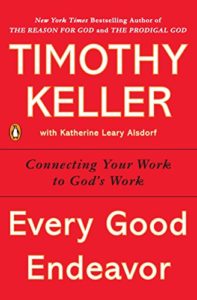“In a work world that is increasingly competitive and insecure, people often have nagging questions: Why am I doing this work? Why is it so hard? Is there anything I can do about it?” Thus the flyleaf for “Every Good Endeavor” introduces Tim Keller’s book about faith and work. This book is much more than a “how to” book regarding faith at work. It is a study of the theology of work with practical application.

While a popular view of work may be that it is a necessary evil resulting from man’s rebellion from God’s creative plan, the book quickly dispels that notion. Work is an ordained part of creation in which man is given what is known as the cultural mandate. The cultural mandate is the command to exercise dominion over the earth, subdue it, and develop its latent potential that appears in the first chapter of Genesis. In essence, mankind is given the work instructions to continue the process of creation.
Unfortunately, as a result of man’s rebellion and the fall, work became toil and in Genesis 3 we are promised thorns and thistles. Keller says, “Work exists now in a world sustained by God but disordered by sin. Only if we have some understanding of how sin distorts work can we hope to counteract its effects and salvage some of the satisfaction that God planned for our work.” This distortion shows up as work often being seen as fruitless, pointless, or selfish and as work revealing our idols.
The author provides this insight “We should be willing to be very engaged with the cultural and vocational worlds of non-Christians. Our thick view of sin will remind us that even explicitly Christian work and culture will always have some idolatrous discourse within it. Our thick view of common grace will remind us that even explicitly non-Christian work and culture will always have some witness to God’s truth in it.”
Work is a vehicle of God’s providence. Keller makes the point that a Christian worldview should naturally flow into a Christian workview. This right view should result for the follower of Jesus in a different view of work, a different set of virtues, a different view of humanity, a different source of guidance, and a different audience for our work. 1 Corinthians 10 exhorts us to “do it all for the glory of God.” Keller references the writings of Luther to point out that, no matter what our profession, our work is a ministry and we are called by God to serve in our work. We should be serving our profession, our employer, our customers, our co-workers, and even our suppliers and the broader community as we serve Jesus Christ. The author makes an important point in a discussion of dualism vs. integration. Dualism is a term used to describe a separating wall between the sacred and the secular. We see dualism most clearly in the practice of Christianity on Sunday morning or only within church activities and the rest of the week is lived with a different set of values. Integration of faith and work is the opposite of dualism where a person’s core values show up in and guide every part of their life.
I highly recommend this book for anyone who wants to grow in living their faith in every part of their life.

Add your comment